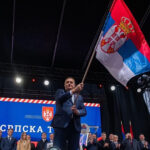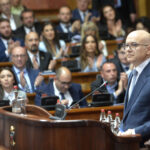- North Macedonia to see presidential election runoff
Candidate from the opposition VMRO-DPMNE Gordana Siljanovska-Davkova sealed 40% of the votes in the first round of presidential elections in North Macedonia on April 24. The incumbent president, Stevo Pendarovski, supported by the ruling SDSM party, gained just under 20%.
The second round of presidential elections, in which Gordana Siljanovska-Davkova and Stevo Pendarovski will face off, will be held on May 8 alongside the parliamentary elections.
The third and fourth places in the first round were taken by the two representatives of the Albanian minority: Minister of Foreign Affairs, candidate from DUI Bujar Osmani (13%) and Mayor of Gostivar, candidate from the opposition coalition “Vredi” (“European Union for Change”) Arben Taravari (9%). The contribution from Albanian voters could become decisive in the runoff. Experts predict that the votes of Osmani supporters may go to Pendarovski, while opposition-minded Albanians who voted for Taravari may chose to snub both candidate.
- EP votes for Western Balkans Growth Plan
The European Union’s new plan foresees the financing of the Western Balkan nations in the amount of EUR 6 billion, of which 2 billion will be provided in the form of grants, and the remaining four – in the form of loans.
The growth plan is supposed to complement the existing pre-entry aid tools, but the allocation of funds from the new financial aid package is subject to a number of additional conditions. It is assumed that the candidate countries to receive funding under the Growth Plan for the Western Balkans must fully align their foreign and security policies with those of the EU, including on the European sanctions against Russia.
Another condition for Kosovo and Serbia is progress in the process of normalizing relations.
Additional conditions make obtaining funds under the new Growth Plan extremely problematic, primarily for Serbia.
- Serbia obliged to normalize relations with Kosovo to join EU
EU foreign ministers passed amendments to Chapter 35 in the accession negotiations with Serbia, which added to Serbia’s commitments steps aimed at normalizing relations with Kosovo. It is about the implementation of the Agreements supported by Belgrade and Pristina within the EU-mediated dialogue last year in Brussels and Ohrid.
Among the main clauses of the agreements are the obligation undertaken by the parties to mutually recognize documents and national symbols, including passports, diplomas, and license plates, as well as Serbia’s obligation not to oppose Kosovo’s membership in any international organization.
In fact, it is about the need for Belgrade’s de facto recognition of Kosovo’s independence and an end to the Serbian campaign against Kosovo’s membership in the Council of Europe. These conditions become a significant obstacle for Serbia’s European integration.
- UNGA postpones consideration of resolution on Srebrenica
The session of the UN General Assembly, at which the vote on the Resolution on the genocide in Srebrenica was supposed to take place on May 2, was postponed.
The text of the resolution is being sent for revision if the UN member states have any other proposals, said BiH Ambassador to the UN, Zlatko Lagumdzija. More time is offered to everyone to get familiarized with the real facts, and also to everyone, including those who are speaking now against the document, to put forward their motions.
The resolution on Srebrenica contains a call to declare July 11 as the International Day of Remembrance for the Victims of the Srebrenica Genocide in 1995 and to include information about the crime in the educational curricula in UN member states. The Serbs of Bosnia and Herzegovina and Serbia stand categorically against the draft as they agree that a crime was committed in Srebrenica but not an act of genocide.
The postponement of the vote on the Resolution at the UN General Assembly is explained by Belgrade’s active efforts in the foreign policy arena and the radicalization of the attitudes among Serbs and Bosniaks in Bosnia and Herzegovina.
- UNSC holds another meeting on Kosovo
The UN Security Council discussed the regular report of UN Secretary General Antonio Guterres on the work of the UN Mission in Kosovo (UNMIK).
In the report for the period from September 19, 2023 to March 15, 2024, which was presented at the session by the head of UNMIK, Caroline Ziadeh, the UN Secretary General, in particular, condemned the incident on September 24 last year in the village of Bansjka, when an armed clash occurred between a Serbian paramilitary group and the Kosovo police. Guterres called for the investigation to be completed and the perpetrators to be brought to justice immediately.
The report also expressed concern over the ban on the use of dinars in Kosovo’s cash transactions because it had a negative impact on the Serbian community. The UN Secretary General called for an urgent discussion of open issues within the framework of a dialogue mediated by the European Union.
The report points to the urgency of forming the Association of Serbian Municipalities, which is Pristina’s duty according to previously signed agreements within the framework of the EU-mediated dialogue.
The majority of permanent and non-permanent members of the Security Council, supporting the main points of the UN Secretary-General’s report, expressed concern over the lack of progress in the inquiry and prosecution of the perpetrators of the armed incident in Bansjka last September and stated the need for both sides to fulfill their commitments under previously signed deals.
The session was held in a rather tense atmosphere. The President of Serbia, Aleksandar Vučić, was extremely dissatisfied with the presence at the meeting, next to the President of Kosovo, Vjosa Osmani, of Kosovo women who suffered from the Serbs during the war.
In fact, the UNSC meeting became part of the campaign for and against Kosovo’s membership in the Council of Europe, in which Belgrade and Pristina are intensively engaging these days.
- European Parliament approves liberalization of visa travel for citizens of Serbia living in Kosovo.
On April 23, 406 out of 597 members of the European Parliament voted for the cancellation of visas for holders of passports issued by the Coordination Office of Serbia, 97 were against the motion, and 94 abstained.
The EU Council is yet to approve the decision.
All countries of the Western Balkans have a visa-free travel with the countries of the European Union.
Serbian citizens in Kosovo who hold passports issued by the Coordination Administration of Serbia remain the only residents of the region who need a visa to travel to the EU. Serbian authorities have repeatedly emphasized that this situation is discrimination against Serbian citizens living in Kosovo.
- Forums on security cooperation between CEE and Western Balkans held in Hungary
A meeting of the Central European Defense Cooperation (CEDC) and the Budapest Security Dialogue (BSD) took place in Budapest, as part of which an exhibition of the defense industry was held. Five countries from Central Europe (Austria, the Czech Republic, Croatia, Hungary (which currently chairs the CEDC), Slovakia, and Slovenia) and six countries of the Western Balkans (Albania, Bosnia and Herzegovina, Kosovo, Montenegro, North Macedonia, Serbia) took part in the events.
The main topics of the CEDC negotiations were the current security challenges facing the Western Balkans and the European and Euro-Atlantic integration of the region, as well as the establishment of the Western Balkans Security and Defense Academy in Montenegro.
The Budapest Security Forum discussed the place of Central Europe and the Western Balkans in the new European security architecture.
In his opening speech at the BSD, the Minister of National Defense of Hungary, Kristóf Szalay-Bobrovniczky, emphasized: “everyone talks about war, and peace is our most important treasure”, it must be preserved and every possible opportunity should be grasped to emphasize the importance of peace. The voice of Central Europe and the Western Balkans should be heard on this extremely important issue, he noted. Our duty is “to be defenders of peace,” stressed Szalay-Bobrovniczky.
The events show that Hungary is actively working to promote its vision of European security policy, first of all, regarding the war in Ukraine and the formation of a circle of like-minded figures both within the EU and outside the European Union – in the Western Balkans. The intensive interaction of the Hungarian authorities with the Western Balkans aims not only at promoting the establishment of Hungary as a regional leader, but also at influencing the foreign and security policy of the Western Balkan nations to bring it closer to the position maintained by Budapest.
- Dodik meets with Patrushev
President of Republika Srpska Milorad Dodik took part in the “International Meeting of High Representatives on Security Issues” in St. Petersburg. On the sidelines of the forum, Dodik met with the Secretary of the Russian Security Council, Nikolai Patrushev.
Patrushev noted that Moscow especially appreciates the “principled position” maintained by Republika Srpska “against aligning with the sanctions” and “firm and consistent line regarding the Ukrainian crisis.”
Dodik, in turn, thanked Patrushev for the way Republika Srpska is “treated in Russia” – “you personally, President Putin, and the Russian state.” According to him, it is about strategic cooperation, which “is of key importance” for the “further existence” of the Republic.
Yet another meeting of the leader of the Bosnian Serbs with representatives of the Russian leadership was likely supposed to demonstrate support that the Russian Federation provides to Republika Srpska, and to become part of the Serbian foreign policy campaign against the adoption of the Resolution on Srebrenica at the UN General Assembly. However, the official reports coming from the Russian side following Patrushev’s meeting with Dodik put the focus on the support to Russia, voiced by Republika Srpska. Coverage of the meeting in Russian media showed that Moscow suffers from the lack of support in the international arena no less than Republika Srpska does.



